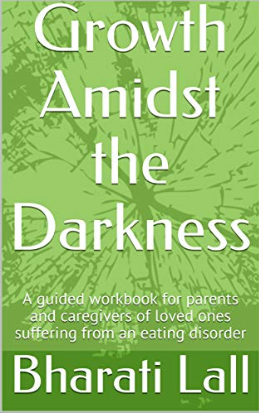Writing connects caregivers and creates a channel for healing

Writing connects caregivers and creates a channel for healing
 A guided workbook for parents and caregivers of loved ones suffering from an eating disorder offers a way to cope through the pandemic and beyond.
A guided workbook for parents and caregivers of loved ones suffering from an eating disorder offers a way to cope through the pandemic and beyond.
For the past 10 weeks I have been working from home. I know, through my own experiences, that writing is a way for me to center myself when feeling confused. This pandemic is stirring emotions and my thoughts are divided. I want to process what I am thinking but I feel overwhelmed. So, I write:
“It is so nice to work from home
I don’t miss the office
I love online shopping
I am so glad I don’t have to ride the bus to work
I am thrilled not to have to make small talk with people at work anymore
Thank goodness my husband and I get along so well
I love having so much time to myself, I can clean and organize our house
I am grateful I have a job and am getting paid, but what if I get laid off, how important is my job? I am not an essential worker
I miss my children, I miss my parents
I want to travel, I am trapped at home
I feel sick, I hate wearing a mask
I am glad I don’t drink alcohol; I wonder how people that rely on AA are going to find support, will addictions be on the rise?
I am practicing mindfulness, I am worried that my children will resort to alcohol as a way to relieve pressure, there is so much addiction in my family
I am feeling anxious, I need to surrender, when will things go back to normal…?”
At times like this I remember the opposing thoughts about my daughter’s eating disorder that would control my mind. One part of me wanted to focus on the positive aspects of her personality, those wonderful qualities that she had and how “things used to be” and another part of me was terrified that she would get sicker, that she would never recover, that our family would never be the same… again, I just wanted things to “go back to normal…”
Through experience, I know that I have been able to adjust to changes throughout my life. Writing has been a way to stay connected to myself. For me, writing has always been a channel where healing occurs. I do not know what happens but somehow the words that I cannot express aloud, seem to flow onto paper, releasing deep emotions that feel safe in written form.
During these strange times, connections to ourselves and others is crucial. Writing can bring us together.
Through the support and mentorship of June Alexander, I was able to create a guided journal for parents so that they could find a safe place to jot down their thoughts and discuss with other parents if they so desire. This is the link to the Growth Amidst the Darkness workbook.
My website: https://blvmentoring.com
A Workbook for Parents and Caregivers
June Alexander
If you are a parent or a caregiver, or know somebody who is, Bharati ‘s guided workbook Growth Amidst the Darknessis for you. Often when we are caring for others, especially someone we love, we put our own self-care and wellbeing on hold. We might feel guilty if every second of every day is not devoted to helping our loved one in facing their challenges. But eventually we feel worn out and possibly even resentful. Sound familiar?
The first major message in this book is that taking care of oneself first and foremost is vital to sustain our own health so that we are in the best position to help our loved one. The second message is that the caregiver often needs to heal as well as the patient, and a third message is that recognition of this offers great opportunity for self-growth and improved relationships with others.
Bharati and I ‘met’ in early 2017 when I presented an online narrative workshop for parents and other caregivers at Western New York Comprehensive Care Center for Eating Disorders. I live in Australia and Bharati lives in the USA yet, when Bharati emailed after the workshop, our friendship blossomed immediately over the Internet. We shared a strong rapport. We both had experience of illness, Bharati as a caregiver and myself as a patient; we both loved nature, and family and friends, and both were passionate about writing as a reflective, self-nurturing and healing tool.
Writing had been a coping tool for each of us during life’s challenges, and I felt excited when Bharati shared her dream of creating a guided journal for caregivers and invited me to be her writing mentor. She had learned many lessons about life and had learned a lot about her own self, as a result of digging deep and reaching out, while facing the challenges of caring for her child who developed an eating disorder.
Initially, Bharati shared, she had not only put her own life on hold, she had put her relationships with other family members and with her friends on hold as well. She became isolated and lonely, and experienced a range of emotions that were foreign to her and often unpleasant. Recognizing that other caregivers might feel as confused and out of their comfort zones as much as she did, Bharati shared her idea for the journal with me.
I was honoured to be Bharati’s mentor, because I could see the need for this book, which has become all the more paramount during COVID-19. The workbook is ideal for use in small groups of caregivers – workable on Zoom as well as in person – it provides writing/reflective tasks for caregivers to do, and then to perhaps share in their group – it is a very uplifting process.
On several occasions during the comparative short time that Bharati took to write her book, I invited her to expand on her reflections for my Dear Diary blog, and each time the reader response was heartening and positive – providing testimony that Bharati’s guidance offers hope and self-help healing to others.
As you work your way through Growth Amidst the Darkness, I am sure you will feel Bharati’s heart and soul coming through her pen. Her candidness and generosity in sharing her experience and hard-won wisdom in offering reflections to ease your journey is evident on every page.
“This Workbook should be required Homework for Caregivers and Parents”
Dr Richard Kreipe, Professor Emeritus of Pediatrics at the University of Rochester, writes:
“This guided journal focuses on helping parents and caregivers of those struggling with an eating disorder. It does so by framing the journey toward healing as a path required, not just caring for the loved one, but also caring for one’s self with insightful loving kindness. In so doing, the all-too-common reactions of guilt, anger, fear, frustration, and hopelessness that can impede recovery can be replaced by acceptance, compassion, connections, courage, truth, emotional support, hope, growth, health and well-being.
“Thirty self-care elements are included, each with a simple reflection from the author’s own experience as a mother, followed by a series of questions for the reader to ponder in diary form. Its simplicity may seem disarming, but there is healing power in filling the blank spaces with rarely explored and often ignored insights. This workbook should be required “homework” for any parent or caregiver of a loved one with an eating disorder.”





